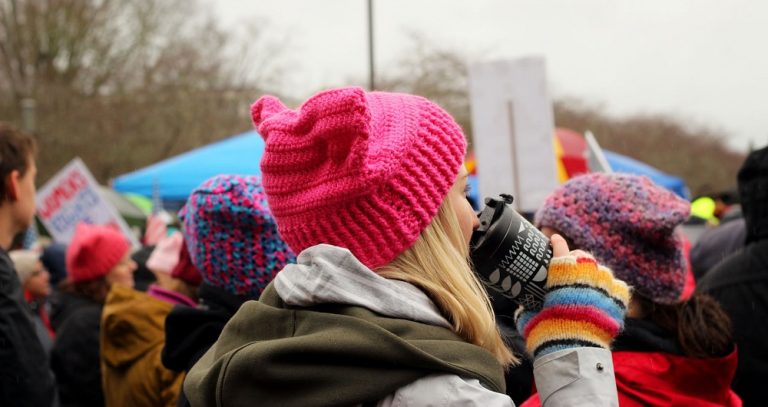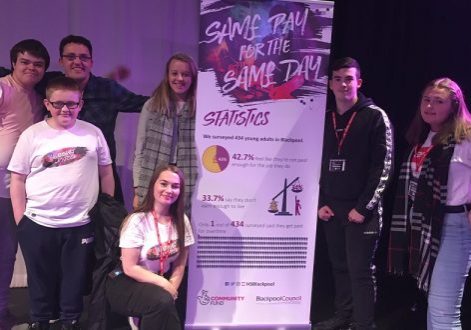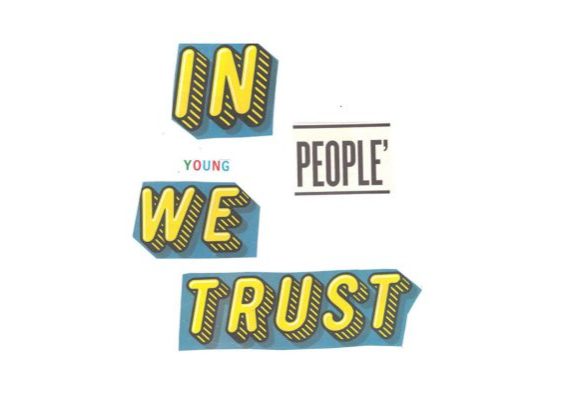Nothing about us without us: civic activism as a mental health intervention with young people
Encouraging young people who face major challenges to take part in community projects may be as successful or even more so in improving their mental health than traditional services.
The University of Brighton is leading a £100,000 research project ‘young people’s activism’ and is working alongside youth researchers who have themselves experienced mental health issues. The project aims to understand if activism can boost identity and sense of belonging in young people who all are too easily denied opportunities.
One of the lead co-researchers on the project, Gabby aged 11 and from Blackpool, said:
“Being involved in research has already helped to stop me feeling lonely by connecting me with other young people. It gave me a focus and purpose and helped my communication skills because I was talking to new people and having discussions about lots of different topics. It felt good to be able to make a difference and to be able to help others through research.”
Principal researcher, Professor Angie Hart, the University of Brighton’s Professor of Child, Family and Community Health, said:
“We think adolescence, the age group between 11-25, is the ideal time for this support because during these years we are developing civic identity as we move out of childhood.
“Research tells us that a strong and positive civic identity offers us direction in life and indicates that we matter in the world. All this is good for our current and future mental health. Perhaps activism can help with this?”
The project is funded by the government’s Strategic Priorities Fund and delivered by the Medical Research Council with the Arts and Humanities Research Council and Economic and Social Research Council as part of UK Research and Innovation. It will test survey results from 300 young people in Blackpool, the London Borough of Newham and Cornwall, and will explore worldwide research on the subject.
Partners include local councils and the Boingboing social enterprise which comprises University staff, volunteers and friends dedicated to “beating the odds and changing the odds through resilience research and practice” and challenging social inequalities. Research events co-run by Blackpool, Brighton, Newham and Cornwall youth team members are already underway.
Professor Hart, from the University’s Centre of Resilience for Social Justice, received national recognition for co-leading a ‘Resilience Revolution’ programme which is delivering lasting improvements with and for young people in Blackpool through £10.4m Big Lottery Head Start funding.
With youth peers, practitioners, parents/carers, academics, community groups, police, health and schools, the Resilience Revolution provides “crib-to-college support to help with prevention, and positive resilience for the town’s young people”.
Professor Hart said the new study will build on “research, including some that we have done, which says other ways of improving young people’s mental health might be just as good, if not better, than current mental health services”.
Youth co-researcher Craig said:
“As a young person, I am keen to get involved with this research because I believe everyone has the right to understand how having a say and being involved in society can impact your mental health. I think young people campaigning and playing a part in their communities now will lead to more opportunities later in life. I think this will help young people become more mature. I matured going into year 10 and 11 at high school because of all the help I had around me and the opportunities to get involved in things. I wanted to make the most of them before they were not there anymore.”
Professor Hart said:
“This project explores another way. Does getting involved in activism benefit young people who face many disadvantages? ‘Young people’s activism’ means doing community projects together that make not just our own individual lives better but other young peoples’ too.”
Pauline Wigglesworth from Blackpool Council’s HeadStart Programme, said:
“The project involves helping young people develop their ‘civic identity’ – feeling they belong to a community whether face-to-face, online or both – ‘glocal’ communities is what academics call them. Our hunch is that creating belonging through civic activism could help them have positive identities.”
Professor Hart said:
“We know activism needs researching because in Blackpool we have already had success experimenting with a new way of supporting young people’s mental health.
“This project will help us progress that work and share it with other young people and their adult supporters in Cornwall and Newham, areas of the country which are also facing big challenges. We also want to learn from Newham and Cornwall’s young people’s work on subjects including climate crisis activism.”
Professor Hart will be working with the University of Brighton’s Dr Suna Eryigit Madzwamuse and Dr Karina Rodriguez Echavarria and Queen’s University Belfast’s Amanda Taylor-Beswick. Co-researchers include young people facing major challenges, adult community-based researchers, academics from other universities and mental health practitioners.
Project time-frame
This research project commenced in April 2020.
Project aims
The aims and activities of this research project are:
- Doing a ‘literature review’. This means exploring what academics worldwide have already published on building young people’s positive identities when they are facing many disadvantages.
- Organising and running a big meeting (called a ‘networking summit’) and inviting lots of people interested in our work and who have influence.
- Running 3 events using safe and ethical technologies, co-designed and co-led by young people from Blackpool, Brighton, Newham and Cornwall. We aim to find out about young people connecting with their communities’ history; young people getting actively involved with their present communities, to get involved in making positive changes; and young people actively contributing to their communities’ future through civic activism.
- Surveying young people in Blackpool, Newham and Cornwall to test survey questions already available about young people’s identity, civic activism and mental health.
Project findings and impact
The research project is ongoing and outputs, findings and impact will be updated in due course.
Project team
Prof Angie Hart, Centre of Resilience for Social Justice / Cupp Academic Director, University of Brighton
Dr Suna Eryigit-Madzwamuse, School of Health Sciences, University of Brighton
Dr Karina Rodriguez Echavarria, School of Computing, Engineering & Maths, University of Brighton
Dr Amanda Taylor-Beswick, School of Social Science, Education & Social Work, Queen’s University of Belfast
Youth co-researchers from Blackpool, Cornwall & Newham
Project partners
Centre of Resilience for Social Justice, University of Brighton, UK
Boingboing Social Enterprise, UK
Cornwall Council
National Lottery Community Fund HeadStart partnership, UK
Newham Council
Resilience Revolution community collaborators in Blackpool, UK
Revolution Researchers (Youth Co-researcher Group)
Neighbourhood Watch
Queen’s University Belfast
Nothing about us without us survey
You can read more about the NAUWU survey here



